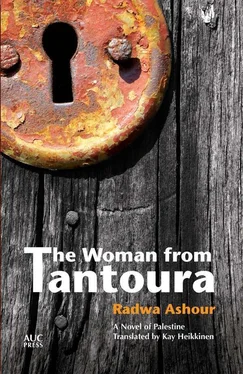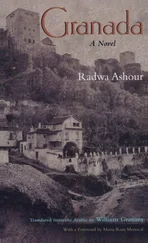My uncle turned to me and said, “What do you say, Ruqayya?”
I didn’t utter a word. During the night I cried. It wasn’t because I wanted Yahya. He seemed distant; the days had folded him away with other things, and even his image as he emerged from the sea no longer came to me. I cried without knowing the reason for my crying. Then Amin came from Beirut and the contract was written, with my uncle as my witness. He announced in front of everyone: “Amin, I am giving you my daughter Ruqayya. She will be your wife and the mother of your children, but before that and after it she is my brother’s daughter, and not one but three martyrs watch over her. So let her be the delight of your eye as she is the delight of my eye and of theirs.” Amin wiped his eyes and signed the contract.
Ezz broke in and said to the sheikh, “How can we draw up the marriage contract when Amin hasn’t asked me for Ruqayya. Ask me for her now, Amin, or else …” He laughed, and so did the others who were there.
Did Amin want me or did his father compel him to marry me because I was the daughter of both his uncle and his aunt, and an orphan with no father or brothers? As a young doctor, what did he want with a girl who hadn’t completed her high school education? What did he want with a refugee who was a guest in her uncle’s house, when he in turn was living as a guest with the family of a friend of his from Sidon?
I would ride the train without fuss, and remain outside of it also. I would give Amin what was expected of a good wife, affection and little ones, a bite to eat and a clean house, and I would give him myself in an intimate moment and become more confused, because after every intimacy I would wonder what happened. It seemed to me that this was the nature of things. A man would turn to his wife and then take her and she would give herself to him. Perhaps she would be surprised by some unexpected pleasure, not knowing where it came from, and it would add to her confusion.
After he graduated from the university Amin worked as a doctor in UNRWA, the United Nations relief agency. He didn’t try to travel to the Gulf as others did when they didn’t find work in Lebanon. He would always say that he was lucky, because he had found the work he wanted in the city he wanted. I had my three children in Sidon, then we moved to Beirut because Amin started to work with the Palestinian Red Crescent. We lived near the Tariq al-Jadida neighborhood, no more than ten minutes’ walking distance from the Sabra market. When Acre Hospital was established on the south edge of the Shatila Camp, Amin went to work in it. He was absorbed in his work, and he would be gone a lot from the house. It was like a holiday when he was with the children. His work freed him from orders, prohibitions, and controlling the conduct of three boys who could slip from the devilment of kids to become devils. Amin was calm by nature, patient, and spoke little. I never saw him scold one of the boys, even when he made a mistake. He would say, “His own good breeding will correct him, don’t worry.” Was Amin like me, both outside of the train and inside it, or did his work as a doctor provide him with a private train that belonged to him and tamed the wildness of his spirit? I don’t know. In fact I sometimes wonder if I really knew Amin. I search my memory for him when we were in the village; his name was present more than his person. He was seven years older than I was, and he was only there during the summer vacation. No sooner had he finished studying in the village school than my uncle sent him to the high school in Acre, and after that he moved to Beirut to study medicine. Even during the vacation I would see him only when the family gathered for dinner or supper. Where’s Amin? His mother would answer, complaining, “He doesn’t lift his eyes from the books. I tell him, ‘You’ll ruin your eyes from so much reading.’” Sometimes he would go swimming with the young men of the village. I had no relationship with him. He was near and far, unlike his brother Ezzedin, who was a year younger than I was. My mother would say, “It’s as if those two were brothers born one right after the other.” We would fight regularly, every day, Ezz and I, hitting each other, but neither of us could do without the other. We would play together, compete in swimming and diving and picking almonds and peeling Indian figs. Mostly he would win and I would go crazy because I was older. In school he could solve arithmetic problems that were hard for me. He would fill the house with, “Ruqayya’s an ass, she’s a year older than me and can’t solve the arithmetic problem!” I would interrupt, “Liar, it’s only nine months, not a year!” I would hate him and decide not to ask for his help in anything. Two days later I would return to him and ask. I know Ezzedin; I wonder, do I really know Amin? I live with him, I take care of his needs. In the faces of our three children some of his features mix with some of mine. Maybe we look alike because we are paternal cousins and my mother is also his mother’s sister; maybe, as it usually happens to married couples after living together a long time, the face of each one and the movements of his body have come to mirror the other’s. Amin is a doctor; he has never once been unkind to me, he simply speaks calmly, and if he does rebuke it’s with an allusion. There is no violence in his treatment of me, and no quarreling. Was it my uncle’s admonition to him on the day we were married that dictated this conduct to him, or was he compassionate toward the cousin who had become the mother of his children, an orphan with no brother to turn to if her husband tyrannized her or humiliated her in word or deed? When he would say, “I love you,” in an intimate moment, or when he would say proudly “Ruqayya is a great lady and a wonderful mother,” and kiss my hand suddenly, I would be suddenly troubled, because even though I knew everything about Amin I did not know Amin, and maybe I didn’t know myself. I don’t know what Ruqayya wants from this life.
I’ve completely lost my bearings.
10
The Leap … Does It Make a Tale?
Am I really telling the story of my life or am I leaping away? Can a person tell the story of his life, can he summon up all its details? It might be more like descending into a mine in the belly of the earth, a mine that must be dug first before anyone can go down into it. Is any individual, however strong or energetic, capable of digging a mine with their own two hands? It’s an arduous task requiring many hands and minds, many hoists, bulldozers, and pickaxes, lumber, and iron and elevators descending to the depths beneath and bringing those they took down back to the surface of the earth. A wonderfully strange mine into which you have to descend alone, because it does not belong to anyone else, even if you find things belonging to someone else in it. Then it might suddenly collapse on your head, cracking it open and burying you completely under the debris.
Perhaps it’s more like a bundle than a mine; but can a person tie up his story in a kerchief and then hold it out to others in his hand, saying, “This is my story, my lot in life”? And then, how can you transport a bundle the size of a hand, or a large bundle like those women carry on their heads as they flee east over the bridge, the story of a whole life, a life that’s naturally intertwined with the lives of others?
I haven’t spoken about my uncle Abu Amin. I haven’t told the story of my mother in Sidon, nor the story of Ezzedin. I haven’t talked about my own state. When Hasan spoke to me about his new book project I said to him, “If your grandfather Abu Amin were still among the living he would have told you enough to fill volumes. He was with the rebels from ’36 on and moved around throughout the towns and villages. He was with the resistance in ’47 and ’48, and after they took us out of the town he sneaked back. I don’t remember all the details but I remember a lot of what he said, and I can repeat it to you.” He said, “I’m interested in hearing what my grandfather told you, but now I want your testimony about leaving the village.”
Читать дальше












